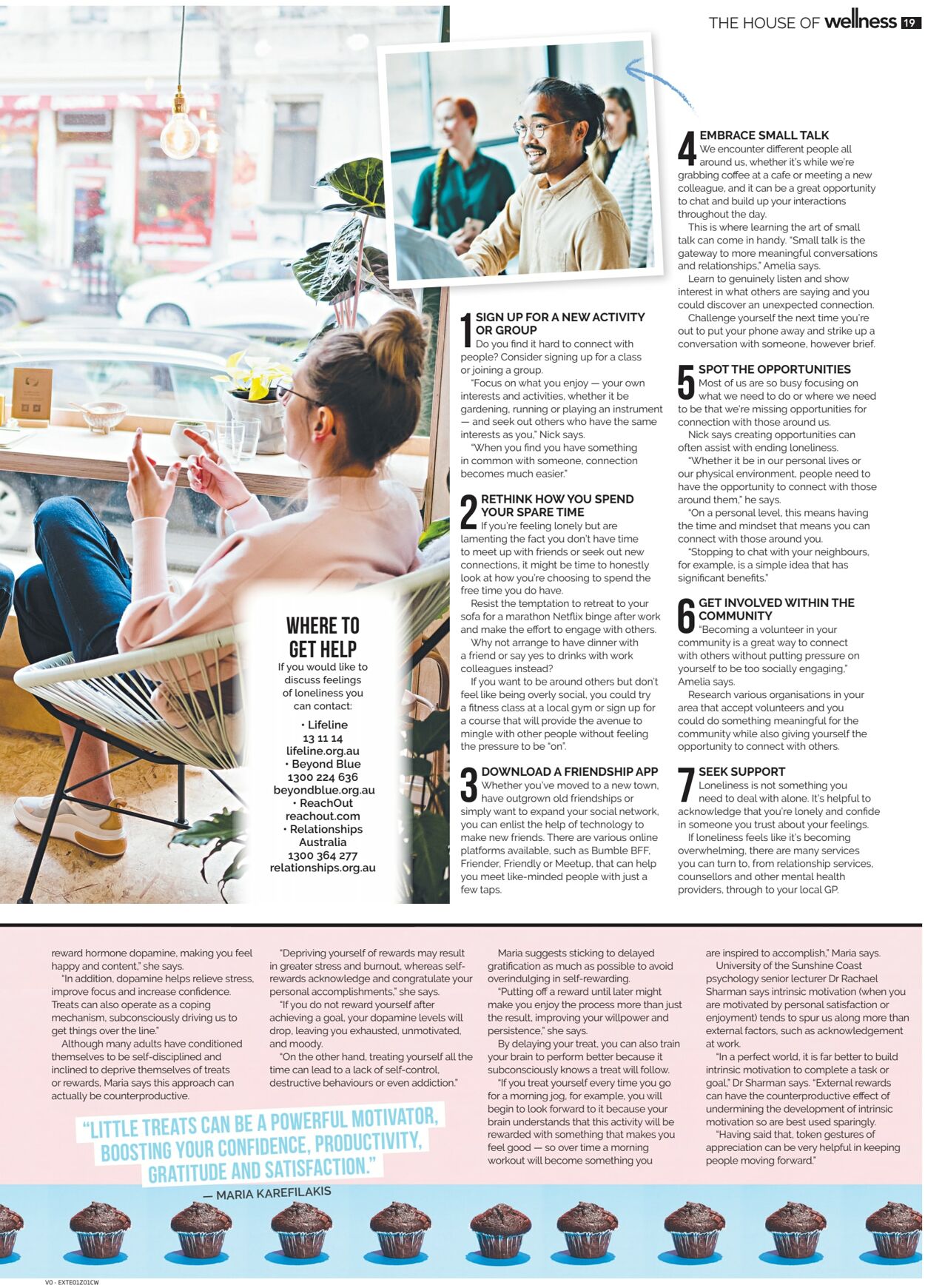













Products in this catalogue
WHERE T0 GET HELP Ifyou would like to discuss feelings of loneliness you can contact: + Lifeline 131114 lifeline.org.au + Beyond Blue 1300 224 636 beyondblue.org.au + ReachOut reachout.com + Relationships Australia 1300 364 277 relationships.org.au OR GROUP Do you find it hard to connect with people? Consider signing up for a class or joining a group “Focus on what you enjoy — your own interests and activities, whether it be gardening, running or playing an instrument — and seek out others who have the same interests as you" Nick says. “When you find you have something in common with someone, connection becomes much easier” 1 SIGN UP FOR A NEW ACTIVITY YOUR SPARE TIME If you're feeling lonely but are lamenting the fact you don't have time to meet up with friends or seek out new connections, it might be time to honestly look at how you're choosing to spend the free time you do have. Resist the temptation to retreat to your sofa for a marathon Netflix binge after work and make the effort to engage with others. Why not arrange to have dinner with a friend or say yes to drinks with work colleagues instead? Ifyou want to be around others but don't feel like being overly social, you could try a fitness class at a local gym or sign up for a course that will provide the avenue to mingle with other people without feeling the pressure to be ‘on’ 2 RETHINK HOW YOU SPEND DOWNLOAD A FRIENDSHIP APP Whether you've moved to a new town, have outgrown old friendships or simply want to expand your social network. you can enlist the help of technology to make new friends. There are various online platforms available, such as Bumble BFF. Friender, Friendly or Meetup, that can help you meet like-minded people with just a few taps, THE HOUSE OF wellness We encounter different people all around us, whether it's while we're grabbing coffee at a cafe or meeting a new colleague, and it can be a great opportunity to chat and build up your interactions throughout the day. This is where learning the art of small talk can come in handy. “Small talk is the gateway to more meaningful conversations and relationships’ Amelia says. Leam to genuinely listen and show interest in what others are saying and you could discover an unexpected connection Challenge yourself the next time you're out to put your phone away and strike up a conversation with someone, however brief. 4 EMBRACE SMALL TALK Most of us are so busy focusing on what we need to do or where we need to be that we're missing opportunities for connection with those around us. Nick says creating opportunities can often assist with ending loneliness. “Whether it be in our personal lives or our physical environment, people need to have the opportunity to connect with those around them, he says. “On a personal level. this means having the time and mindset that means you can connect with those around you. "Stopping to chat with your neighbours, for example, is a simple idea that has significant benefits? 6 GET INVOLVED WITHIN THE 5 SPOT THE OPPORTUNITIES COMMUNITY “Becoming a volunteer in your community is a great way to connect with others without putting pressure on yourself to be too socially engaging: Amelia says, Research various organisations in your area that accept volunteers and you could do something meaningful for the community while also giving yourself the opportunity to connect with others. Loneliness is not something you need to deat with atone. I's helpful to acknowledge that you're lonely and confide in someone you trust about your feelings. If loneliness feels like it's becoming overwhelming, there are many services you can turn to, from relationship services. counsellors and other mental health providers, through to your local GP. 7 SEEK SUPPORT reward hormone dopamine, making you feel happy and content, she says. “In addition. dopamine helps relieve stress, improve focus and increase confidence. Treats can also operate as a coping mechanism, subconsciously driving us to get things over the line” Although many adults have conditioned themselves to be self-disciplined and inclined to deprive themselves of treats or rewards, Maria says this approach can actually be counterproductive. “Depriving yourself of rewards may result in greater stress and burnout, whereas self- rewards acknowledge and congratulate your personal accomplishments,’ she says. “if you do not reward yourself after achieving a goal, your dopamine levels will drop, leaving you exhausted, unmotivated, and moody. ‘On the other hand, treating yourself all the time can lead to a lack of self-control, destructive behaviours or even addiction” I ATOR, “LITTLE TREATS CAN BE A POWERFUL MOTIV BOOSTING YOUR CONFIDENCE, PRODUCTIVITY, GRATITUDE AND SATISFACTION — MARIA KAREFILAKIS if$eeeesec ces "VO: EXTEDIZOICW Maria suggests sticking to delayed gratification as much as possible to avoid ‘overindulging in self-rewarding. “Putting off a reward until later might make you enjoy the process more than just. the result, improving your willpower and persistence” she says. By delaying your treat. you can also train your brain to perform better because it subconsciously knows a treat wil follow. “if you treat yourself every time you go fora moming jog, for example, you will begin to look forward to it because your brain understands that this activity will be rewarded with something that makes you feel good — so over time a morning ‘workout will become something you are inspired to accomplish’ Maria says. University of the Sunshine Coast psychology senior lecturer Dr Rachael Sharman says intrinsic motivation (when you are motivated by personal satisfaction or enjoyment) tends to spur us along more than external factors, such as acknowledgement at work “Ina perfect world, itis far better to build intrinsic motivation to complete a task or goal” Dr Sharman says. “External rewards can have the counterproductive effect of undermining the development of intrinsic motivation so are best used sparingly. “Having said that, token gestures of appreciation can be very helpful in keeping people moving forward”
| Name | Details |
|---|